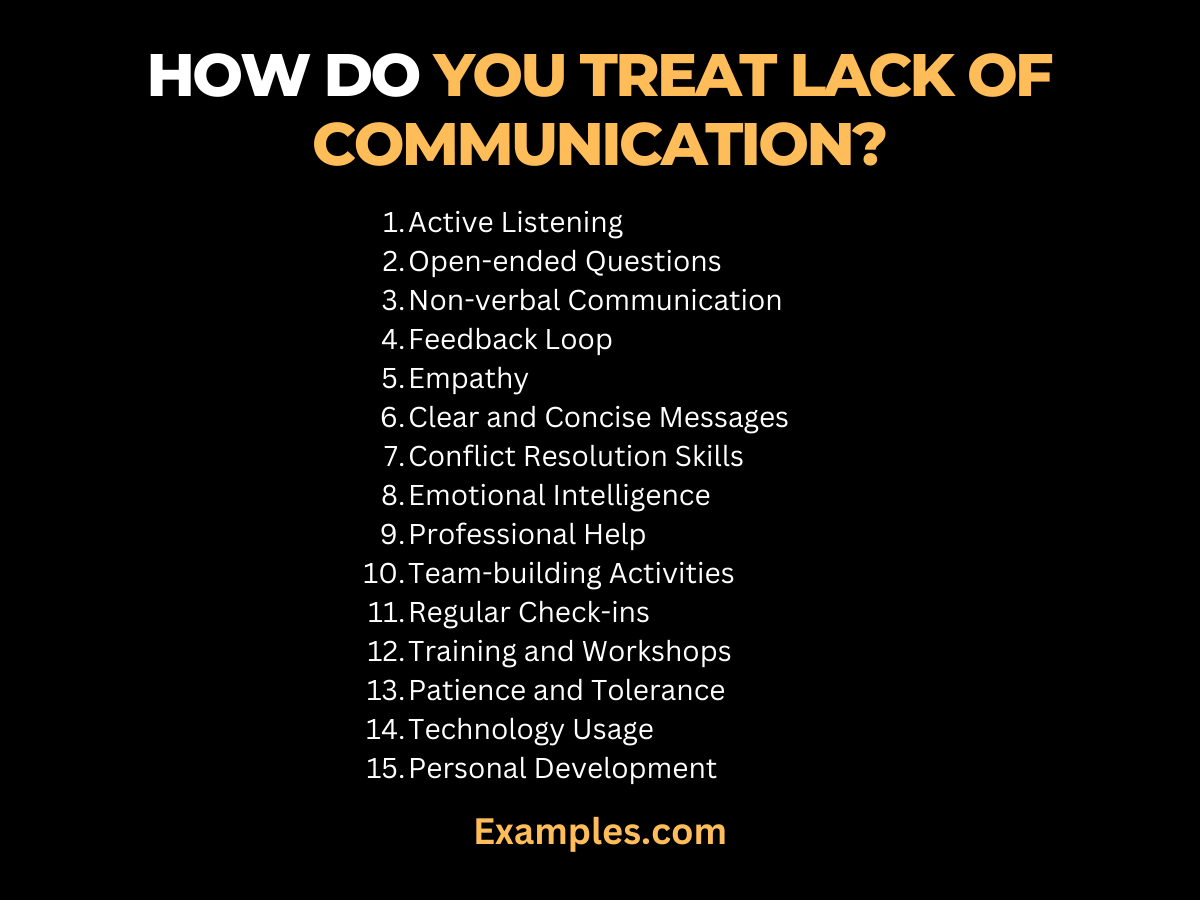How Do You Treat Lack of Communication?
How Do You Treat Lack of Communication?

Treating lack of communication involves a multifaceted approach, addressing both the causes and the effects it has on personal and professional relationships.
- Active Listening: Develop the habit of actively listening to others. This means fully concentrating, understanding, responding, and then remembering what is being said.
- Open-ended Questions: Ask questions that require more than a yes or no answer. This encourages deeper conversation and understanding.
- Non-verbal Communication: Pay attention to body language, facial expressions, and eye contact. Lack of eye contact in communication, for example, can signal disinterest or discomfort.
- Feedback Loop: Implement a feedback loop in conversations. Repeat or summarize what you’ve heard to ensure mutual understanding.
- Empathy: Show empathy by trying to understand the emotions and perspectives of others.
- Clear and Concise Messages: Be clear and concise in your communication. Avoid jargon and overcomplication.
- Conflict Resolution Skills: Develop skills to handle conflicts constructively. Avoiding or mishandling conflicts can lead to further communication breakdowns.
- Emotional Intelligence: Work on improving your emotional intelligence to better understand and manage your emotions and those of others.
- Professional Help: If lack of communication in a relationship or marriage is severe, consider seeking help from a counselor or therapist.
- Team-building Activities: In a workplace, engage in team-building activities to enhance communication and teamwork.
- Regular Check-ins: In personal and professional settings, schedule regular check-ins or meetings to discuss any issues or concerns.
- Training and Workshops: Attend workshops or training sessions on effective communication skills.
- Patience and Tolerance: Practice patience and tolerance. Understanding that effective communication takes time and effort is crucial.
- Technology Usage: Utilize technology appropriately to maintain communication, especially in long-distance scenarios or in the workplace.
- Personal Development: Continuously work on personal development, as self-improvement often leads to better communication skills.
How do you treat lack of communication in the Workplace?
Lack of communication in the workplace can lead to a variety of issues, including decreased productivity, misunderstandings, and lowered morale. Here’s how to address and treat it:
- Identify the Root Causes: Understanding the causes of communication breakdown is the first step. This might include Lack of Communication Causes & Reasons such as unclear roles, lack of regular meetings, or an unsupportive work culture.
- Implement Regular Meetings and Check-ins: Schedule regular team meetings and one-on-one check-ins to ensure everyone is on the same page. This helps in addressing any concerns promptly.
- Encourage Open Dialogue: Create an environment where employees feel comfortable voicing their opinions and concerns. This can be achieved through anonymous feedback systems or open forum discussions.
- Invest in Communication Training: Sometimes, the problem stems from a Lack of Communication Skills. Providing training can help employees communicate more effectively.
- Utilize Effective Communication Tools: Incorporate tools and platforms that facilitate easier and clearer communication, such as project management software or internal communication channels.
- Lead by Example: Management should demonstrate good communication practices, setting a standard for the entire team.
- Recognize and Reward Effective Communication: Acknowledge when teams or individuals communicate well to encourage this behavior.
- Establish Clear Protocols: Define clear communication protocols, like how and when to escalate issues, and ensure these are followed.
- Monitor and Adjust Strategies: Regularly assess the effectiveness of communication strategies and make adjustments as needed.
How do you treat lack of communication in a Relationship?
Effective communication is vital in maintaining healthy relationships. Here are ways to improve communication:
- Acknowledge the Issue: Recognize and accept that there is a Lack of Communication in a Relationship or Lack of Communication in Marriage. This acknowledgement is crucial for both parties.
- Set Aside Time to Talk: Dedicate uninterrupted time for open and honest conversations. This can be daily or weekly, depending on schedules.
- Practice Active Listening: Ensure that when one person speaks, the other is actively listening, not just waiting to respond. This involves making eye contact and showing engagement.
- Express Feelings Clearly: Instead of expecting the other person to read between the lines, express thoughts and feelings clearly and respectfully.
- Use “I” Statements: To avoid placing blame, use statements like “I feel” or “I think,” which can help in conveying feelings without making the other person defensive.
- Seek to Understand Before Being Understood: Try to understand your partner’s perspective before trying to get them to understand yours.
- Engage in Relationship Counseling: If communication issues persist, seeking professional help like counseling can provide tools and techniques to improve communication.
- Build Trust and Patience: Trust and patience are key in a relationship, especially when working through communication barriers.
- Avoid Distractions: During conversations, avoid distractions like phones or television to show that the conversation is a priority.
Treating lack of communication, whether in the workplace or in relationships, demands active efforts. It involves understanding underlying issues, practicing open and respectful dialogue, and implementing consistent strategies for improvement. By prioritizing effective communication, we can foster stronger connections and more harmonious interactions in all aspects of life.



